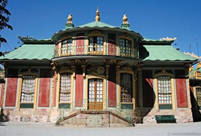 Vintage cars show kicks off in London
Vintage cars show kicks off in London
 Gorgeous scenery in NE China
Gorgeous scenery in NE China
 Picturesque Barkol grassland in Xinjiang
Picturesque Barkol grassland in Xinjiang
 Small Wild Goose Pagoda - A World Cultural Heritage Site along the Silk Road
Small Wild Goose Pagoda - A World Cultural Heritage Site along the Silk Road
 Maritime Silk Road Luxuries of the Han Dynasty
Maritime Silk Road Luxuries of the Han Dynasty
 Ciao! Chinese beauties!
Ciao! Chinese beauties!
 An eye feast: BFA freshmen registration
An eye feast: BFA freshmen registration
 Top 10 most lavish weddings
Top 10 most lavish weddings
 Most amazing chi-pao beauties
Most amazing chi-pao beauties
 Chinese lingerie brand arrives in Las Vegas
Chinese lingerie brand arrives in Las Vegas
MOSCOW, Sept. 12 -- The 13-year-old Shanghai Cooperation Organization (SCO) has grown into a dynamic platform for regional interaction and is entering a phase of broader cooperation, Russian experts said.
"If we look at the SCO as a whole, its advance is obvious," Sergei Lousianin, deputy director of Russia's Far East Institute, told Xinhua as an SCO summit is being held in Dushanbe, the Tajik capital.
The organization has been gaining influence in recent years and has attracted a number of countries to join it or lift their status within it, he said.
Atop the agenda of the summit could be issues concerning security and economic cooperation as well as the SCO's expansion, which "undoubtedly is good news for those who want to stay closer to the organization," said Sergei Kanavsky, executive secretary of the SCO Business Council.
Against the backdrop of the upcoming withdrawal of Western forces from Afghanistan, where threats of terrorism and extremism persist along with raging drug trafficking, the SCO will further enhance security cooperation, the experts said.
Yet, by no means will the organization intervene in Afghan affairs with armed forces as it is not a military-political bloc, Lousianin said.
He said he believed it was the right time to give the Tashkent-based SCO anti-terror center more power, especially that of anti-drug nature.
Denis Tyurin, director of the SCO Business Club, said the organization could offer economic aid to Afghanistan and launch a negotiation mechanism involving conflicting parties of that country under the SCO framework.
While acknowledging that economic interaction has yielded substantial results, the experts said multilateral cooperation still has much potential to tap.
"The SCO is leading a new type of economic relations ... The advantage of the cooperation lies in project cooperation," Kanavsky said, hailing the openness and inclusiveness of the organization.
He also praised Chinese President Xi Jinping's initiative to build the Silk Road Economic Belt, which involves dozens of countries spanning Eurasia with a combined population of 3 billion, saying China has "fully and transparently" explained its concept.
Lousianin echoed the opinion that the belt could boost multilateral cooperation, and said cooperation within the SCO organically corresponds with that within the Eurasian Economic Union, which is set to be launched by Russia, Kazakhstan and Belarus on Jan. 1, 2015.
"Eurasia is a common field for integration and cooperation," he said.
Another thing that pulls SCO members closer is the 70th anniversary of the end of World War II.
Their common victory should not only be celebrated as a victory over German Nazism, but also as a defeat of Japanese militarism, Lousianin said.
The experts agreed that cultural cooperation has been developing rapidly, with the SCO University - a network of existing universities in SCO member states and observer states - being the flagship project.
About 100 universities from SCO member countries have been included in people-to-people exchange programs.
The experts said the countries should also realize such proposals as building a SCO TV station and creating art and film festivals, adding that cultural cooperation could become "one of the most promising fields."
 Appreciating red leaves in early autumn
Appreciating red leaves in early autumn Apple introduces larger iPhones, new watch
Apple introduces larger iPhones, new watch Chinese Buddhist Canon blesses Hong Kong
Chinese Buddhist Canon blesses Hong Kong Beautiful postgraduate teaches in remote area
Beautiful postgraduate teaches in remote area Amazing Guinness World Records
Amazing Guinness World Records Freshmen of Beijing Dance Academy take military training
Freshmen of Beijing Dance Academy take military training Chinoiserie architectures overseas
Chinoiserie architectures overseas Top 10 world's highest-paid models 2014
Top 10 world's highest-paid models 2014 Following the step of Zheng He
Following the step of Zheng He Childhood on grassland
Childhood on grassland Traditional Zhou dynasty style proposal
Traditional Zhou dynasty style proposal Tibetan students embrace new semester
Tibetan students embrace new semester Peace Mission 2014 joint military drill
Peace Mission 2014 joint military drill Sand painting world
Sand painting world Mind-boggling building looks like 'house of cards'
Mind-boggling building looks like 'house of cards'Day|Week|Month